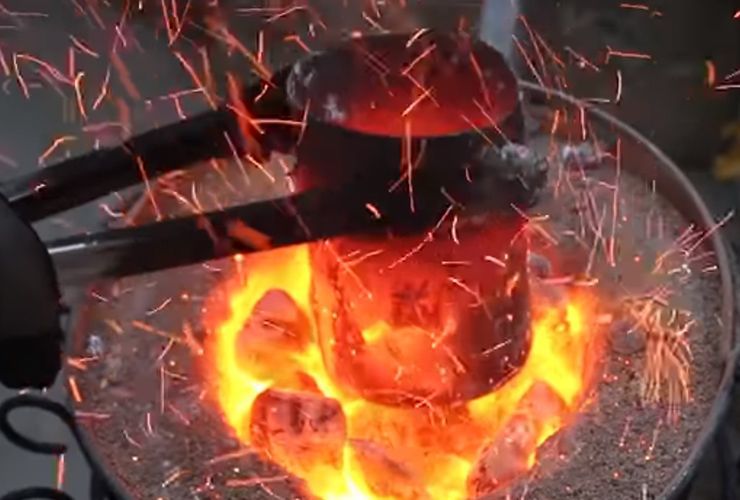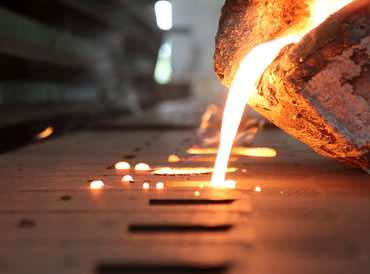Exploring the Function of a Metal Foundry in Modern Production Processes
Metal foundries are pivotal in the landscape of modern-day production. They offer crucial components throughout numerous fields, adjusting to the demands of sectors like automotive and aerospace. Advanced strategies such as 3D printing and automated casting have transformed their procedures. Additionally, sustainability has actually ended up being a concern, influencing their methods. As these foundries develop, the effects for producing efficiency and technology are considerable, elevating concerns about their future trajectory in an ever-changing economic climate.
The Development of Metal Casting Techniques

With the surge of mass production, foundries embraced approaches like die casting and shed foam casting, improving the production procedure and reducing waste. Each evolution in metal casting methods has actually accommodated the requirements of numerous markets, from automobile to aerospace. As metal casting remains to advancement, the interplay between technique and technology remains critical in conference modern-day production difficulties, guaranteeing that foundries flourish and adapt in an ever-changing landscape.
Combination of Advanced Technologies in Foundries
Although standard metal casting approaches have served the sector well for centuries, the assimilation of advanced innovations in foundries is transforming the manufacturing landscape. Automation and robotics simplify production processes, improving performance and lowering the danger of human mistake. Technologies such as 3D printing enable fast prototyping and the development of complex geometries that were when difficult with standard approaches. In addition, data analytics and the Web of Points (IoT) make it possible for real-time monitoring and predictive upkeep, ultimately bring about minimized downtime and boosted productivity. These developments likewise assist in customization, enabling suppliers to react rapidly to market demands. As sustainability ends up being a concern, the adoption of environmentally pleasant innovations, such as electrical melting heating systems and advanced sand improvement systems, better shows the sector's commitment to innovation. Jointly, these modern technologies not just enhance functional efficiency however likewise setting foundries at the forefront of modern production practices.
The Impact of Product Scientific Research on Foundry Workflow
Product scientific research plays a critical role in enhancing foundry procedures, affecting both the choice of materials and the overall casting process. Advancements in material scientific research give a much deeper understanding of the residential or commercial properties of steels and alloys, enabling foundries to select the most ideal products for particular applications. This expertise boosts the performance and resilience of cast products, which is essential for satisfying industry criteria.
Additionally, developments in material formulations and ingredients contribute to enhanced casting techniques, lowering flaws and optimizing production efficiency. The advancement of advanced metal compounds and wise materials permits foundries to generate lighter, more powerful parts, which are increasingly looked for after in various industries such as automotive and aerospace.
In addition, product science help in the recycling of steels, making processes extra effective and affordable. By leveraging the most recent findings in product scientific research, foundries can adjust to evolving market demands, guaranteeing their competition in a quickly altering manufacturing landscape.
Sustainability Practices in Modern Metal Foundries
With the expanding focus on environmental obligation, contemporary metal foundries are increasingly applying sustainability methods to minimize their environmental impact (Aluminum Casting). One key approach includes the recycling of scrap metal, which not just reduces waste but additionally saves power and resources. Foundries are adopting innovative melting innovations that boost power effectiveness, as a result reducing greenhouse gas exhausts. Additionally, making use of eco-friendly layers and products has actually obtained traction, more minimizing dangerous discharges during production
Water preservation strategies, such as closed-loop cooling systems, are being applied visit this website to reduce freshwater usage. Many foundries are also buying renewable resource resources, like solar and wind, to power their operations, therefore lowering dependence on nonrenewable fuel sources. Furthermore, personnel training programs focused on sustainability techniques promote a culture of environmental understanding within the workforce. These campaigns collectively add to a more sustainable future for metal foundries while satisfying the needs of eco-conscious customers.
The Future of Foundries in an Altering Financial Landscape
As the international economy progresses, foundries face a myriad of challenges and chances that will certainly shape their future (Metal Foundry). The boosting demand for lightweight products and progressed alloys demands innovation in manufacturing techniques and technical integration. Automation and clever manufacturing practices are ending up being necessary for boosting effectiveness and lowering functional prices. Furthermore, the increase of sustainability issues obliges foundries to embrace greener processes and recycling campaigns, lining up with worldwide ecological goals
The financial landscape is also shifting, with supply chain disturbances and fluctuating raw click for more product rates offering substantial hurdles. Foundries need to adapt by diversifying their supply sources and buying products science. Collaboration with industries such as eco-friendly energy and electrical automobiles can foster development. Inevitably, the future of foundries will certainly depend on their capacity to utilize technical developments while remaining receptive to market dynamics and environmental imperatives, ensuring their relevance in contemporary manufacturing.
Frequently Asked Questions
What Kinds of Metals Are Typically Utilized in Foundries Today?
Typically used steels in foundries today consist of light weight aluminum, iron, steel, zinc, and copper. These products are favored for their diverse residential properties, making it possible for a large range of applications in sectors such as automotive, aerospace, and construction.
Exactly how Does a Factory Ensure Quality Assurance in Its Products?

What Precaution Are Carried Out in a Metal Foundry?
Metal foundries implement safety actions consisting of personal protective equipment, air flow systems to decrease breathing of fumes, regular safety training for workers, emergency situation reaction methods, and strenuous equipment upkeep to minimize risks and guarantee a safe workplace.
For how long Does the Metal Casting Refine Generally Take?
The metal casting procedure commonly takes several hours to days, relying on elements such as the intricacy of the mold and mildew, the sort of metal made use of, and cooling down times. Each task's demands substantially affect the duration.
What Industries Largely Depend On Metal Foundries for Manufacturing?
Automotive, equipment, building, and aerospace markets largely depend on metal foundries for production. These markets make use of find out this here cast metals for parts, making certain sturdiness and efficiency crucial for their particular applications in production and assembly procedures.
Metal foundries are critical in the landscape of modern-day production. Metal Foundry. Standard metal casting approaches have actually offered the sector well for centuries, the assimilation of advanced technologies in foundries is changing the manufacturing landscape. Breakthroughs in material scientific research provide a deeper understanding of the buildings of alloys and steels, making it possible for foundries to pick the most appropriate products for particular applications. With the expanding emphasis on ecological responsibility, modern metal foundries are increasingly implementing sustainability practices to minimize their ecological impact. Automotive, aerospace, building, and machinery markets mainly count on metal foundries for manufacturing